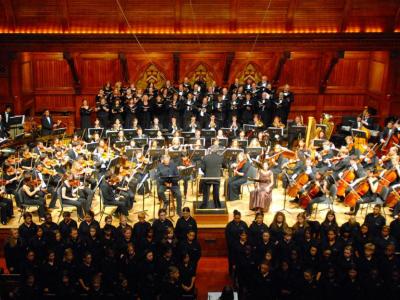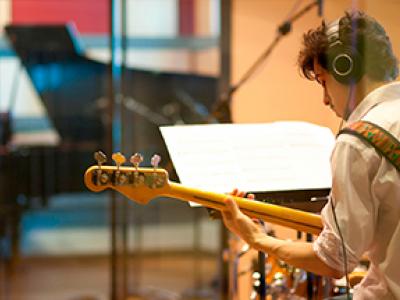What does a Church Musician do?
While many people who think of church music may picture a choir singing from a balcony, the truth is that there are as many ways to incorporate music into worship as there are to practice Christianity. Some churches stay close to their religious musical traditions, employing organists to accompany sermons and lead the congregation or choir in hymns. Others construct eclectic church bands, which might play original compositions in contemporary or experimental genres for the church community. One thing is for certain: any Christian who's interested in expressing or channeling their faith through music can find a place in this diverse and growing field.
Organists—also called keyboardists, pianists, and accompanists—are leaders in the church’s music department who may be tasked with recruiting and training members of the worship team, choosing and arranging music for worship services, and accompanying the pastor. Mainly working with hymnal and choral music, organists have a deep well of Christian musical tradition to draw upon. Depending on the size and budget of the church's music department, the church music director may fill the role of organist.
Church bands, on the other hand, are stylistically and instrumentally diverse groups that are as likely to play rock 'n' roll, hip-hop, R&B, or reggae as they are to play hymnal and gospel music. While some churches stick to the rock/gospel instrumentation established in the 60s and 70s—guitar, bass, and drums—and ask their bands to play arrangements of classic hymns, many churches encourage band members to create their own faith-based compositions and explore the different ways that music can serve as praise to God.
At a Glance
Both organists and church band members can become worship leaders, which means an increased focus on organizing rehearsals, selecting music, and leading the congregation. Experienced church musicians can also become church music directors, taking charge of a church's entire musical operation. Church musicians also frequently use their experience working with members of the congregation to enter the field of education, working for schools or creating community music programs.
Church musician positions are easy enough to find, as they're posted online with great frequency. The hard thing is finding one nearby whose worship tradition and musical style both suit the applicant, and which can pay a living wage. Aspiring church musicians should start by reaching out to a local church to see if they need musicians. Even if they don’t, the pastor may know of other churches nearby that do, and can likely provide a clearer picture of what opportunities are available in the area.
- Strong instrumental skills (organ, keyboards, hand bells, guitar, bass, drums, brass, woodwinds, and voice)
- Knowledge of hymns and traditional Christian music
- Musical performance
- Verbal communication
- Education
- Community involvement
- Leadership
Church musicians should be passionate about music and religion. Musically, the best church musicians intuitively understand how to support the pastor’s work and to improve the worship experience for others. The ideal church musician is also an involved member of the church community, whose excellent communication and education skills make others feel at ease and excited about music.
While church musicians are not necessarily expected to be actively religious, or to follow the same sect of Christianity as the church they play for, most are active members of the congregation and community who perform this role as a side gig. Generally, church musicians live near the churches for which they play, and combine this part-time position with other jobs (as a general business musician, for example) to pay the bills.













